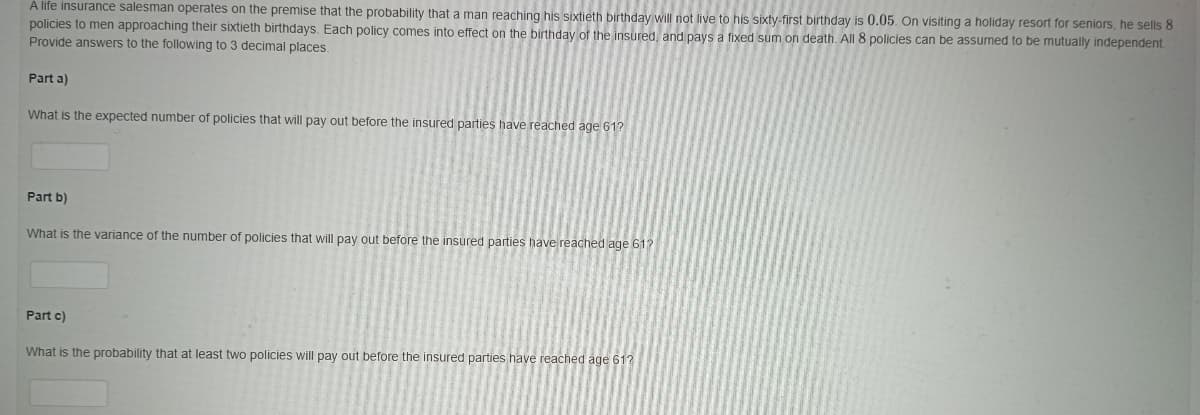Part a) What is the expected number of policies that will pay out before the insured parties have reached age 61? Part b) What is the variance of the number of policies that will pay out before the insured parties have reached age 61? Part c) What is the probability that at least two policies will pay out before the insured parties have reached age 61?
Part a) What is the expected number of policies that will pay out before the insured parties have reached age 61? Part b) What is the variance of the number of policies that will pay out before the insured parties have reached age 61? Part c) What is the probability that at least two policies will pay out before the insured parties have reached age 61?
Algebra & Trigonometry with Analytic Geometry
13th Edition
ISBN:9781133382119
Author:Swokowski
Publisher:Swokowski
Chapter10: Sequences, Series, And Probability
Section10.2: Arithmetic Sequences
Problem 67E
Related questions
Question

Transcribed Image Text:A life insurance salesman operates on the premise that the probability that a man reaching his sixtieth birthday will not live to his sixty-first birthday is 0.05. On visiting a holiday resort for seniors, he sells 8
policies to men approaching their sixtieth birthdays. Each policy comes into effect on the birthday of the insured and pays a fixed sum on death. All 8 policies can be assumed to be mutually independent.
Provide answers to the following to 3 decimal places.
Part a)
What is the expected number of policies that will pay out before the insured parties have reached age 61?
Part b)
What is the variance of the number of policies that will pay out before the insured parties have reached age 61?
Part c)
What is the probability that at least two policies will pay out before the insured parties have reached age 61?
Expert Solution
This question has been solved!
Explore an expertly crafted, step-by-step solution for a thorough understanding of key concepts.
This is a popular solution!
Trending now
This is a popular solution!
Step by step
Solved in 5 steps

Recommended textbooks for you

Algebra & Trigonometry with Analytic Geometry
Algebra
ISBN:
9781133382119
Author:
Swokowski
Publisher:
Cengage

Algebra and Trigonometry (MindTap Course List)
Algebra
ISBN:
9781305071742
Author:
James Stewart, Lothar Redlin, Saleem Watson
Publisher:
Cengage Learning

Elements Of Modern Algebra
Algebra
ISBN:
9781285463230
Author:
Gilbert, Linda, Jimmie
Publisher:
Cengage Learning,

Algebra & Trigonometry with Analytic Geometry
Algebra
ISBN:
9781133382119
Author:
Swokowski
Publisher:
Cengage

Algebra and Trigonometry (MindTap Course List)
Algebra
ISBN:
9781305071742
Author:
James Stewart, Lothar Redlin, Saleem Watson
Publisher:
Cengage Learning

Elements Of Modern Algebra
Algebra
ISBN:
9781285463230
Author:
Gilbert, Linda, Jimmie
Publisher:
Cengage Learning,

College Algebra
Algebra
ISBN:
9781305115545
Author:
James Stewart, Lothar Redlin, Saleem Watson
Publisher:
Cengage Learning